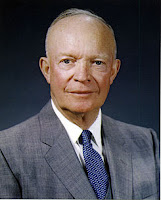“Whenever the people are well-informed, they can be trusted with their own government.” –Thomas Jefferson, 1762-1826.
I was born during the administration of Harry Truman, but the first sitting president I remember was Dwight Eisenhower. He was a Republican, and the Democrat who opposed him both times he ran, in 1952 and 1956, was Adlai Stevenson.
 |
| Stevenson: egghead. |
Eisenhower’s vice presidential running mate, Richard Nixon, called Stevenson an “egghead” during the 1952 campaign. I was not quite five years old, but I remember the fuss about it on the radio. (We didn’t get a television for several more years.) At the time I thought it was a very funny word. My mother tried to explain it to me, but I remember wondering why they were calling Stevenson an egghead when both he and Eisenhower were obviously quite bald.
“Egghead” was an epithet for an intellectual, and in some circles it was quite a disparaging term. Adlai Stevenson was smart and well-educated, Nixon was saying, and that made him suspect. I must admit I’ve never really understood that sentiment. But Eisenhower and Nixon won, both times.
Is that the problem with National Public Radio? It’s for eggheads? Is there something wrong with that?
 |
| Eisenhower: just bald. (Wikipedia photos) |
Blackburn and Republican Majority Leader Eric Cantor of Virginia both claimed that NPR’s news coverage was biased. Blackburn said taxpayers (she is quick to speak for all taxpayers) didn’t want to pay for programming “they do not agree with,” and Cantor said federal funding shouldn’t be used “to advocate one ideology.”
What the hell are they talking about? I’ve listened to the NPR news programs for decades, and I’ve always found them extremely fair to all points of view, bending over backwards to give every side a voice. The richness, depth, and diversity of the subjects NPR covers, compared to other news programs, are like a sip of Guinness Stout after a couple of cans of Coors Light. I’m assuming that it’s the news that offends Blackburn and her cronies and not Lake Woebegone or Click and Clack or Wait Wait… Don’t Tell Me.
I can only assume it is that very richness, depth, and diversity that rankles the right. If you compare NPR with Faux News, you’ll find the former giving perspectives from several points of view while the latter repeats a single theme of gloom and doom and “us and them.” Perhaps Blackburn, et al, are afraid their followers will lose their way if they’re exposed to NPR. As the World War I song puts it, “How ‘Ya Gonna Keep ‘Em Down on the Farm (After They’ve Seen Paree?)”
Maybe I’m missing something. Maybe NPR is an insidious agent of subversive thought and not a refreshing compendium of interesting items from a diverse and complex world.
Nah. I just can’t go there. I’m sorry. As several Democratic representatives said during the debate, NPR is a national treasure.
There is one matter that wasn’t elaborated during the debate. HR-1076 prohibits local public radio stations from purchasing programming from NPR or any other source. My local station airs several non-NPR shows like “Democracy Now” and “Counterspin.” Perhaps it’s programs like this the Republicans are targeting under the blanket of NPR. No one ever accused Amy Goodman of being non-partisan.
But I don’t think that’s all of it. I think the raucous right really has a problem with Morning Edition and All Things Considered. They make people think. People who think don’t follow blindly and they ask too many questions. And that’s dangerous.
Ignorance is simply not knowing something, and can be corrected by instruction or research. Stupidity, though, is intentional ignorance, and is much more difficult to correct. Unfortunately, the United States has a long tradition of self-righteous stupidity that long pre-dates Nixon’s “egghead” epithet.
The “Know Nothing” party of the mid-Nineteenth Century wasn’t named for its lack of knowledge, but for its secrecy. It was an anti-Catholic, anti-immigration group of Protestant males of English heritage. When questioned about the party, members were instructed to reply, “I know nothing.”
What the Know Nothings feared was change, and the undermining of perceived authority and the status quo. The Scopes trial in 1925 reflected the same fears. In fact, fear itself is often the motivation of those who appear to reject rationality. If you don’t believe in global warming, you don’t have to worry about it. If you pass a law making English the official U.S. language, and build walls along the borders, maybe all those strange people with their strange words and strange foods who have moved into your neighborhood will go away.
National Public Radio celebrates new ideas and discoveries. It provides us with voices from all sorts of places expressing all sorts of opinions. Perhaps this is the problem: it engenders fear.
So how do ya keep ‘em down on the farm? Don’t let ‘em even hear about Paree!

No comments:
Post a Comment